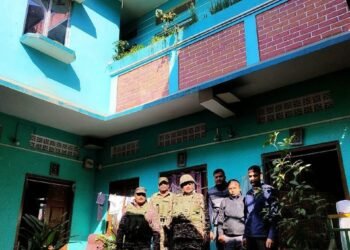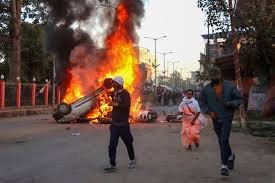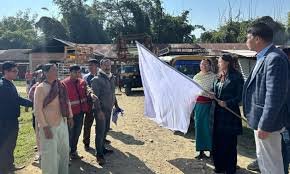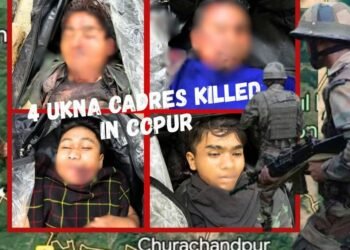A five-part series into spine-chilling cases of violence and impunity across Manipur’s conflict zones—murders unsolved, lives unacknowledged, justice delayed or denied. This series sheds light on those left behind in the shadows of state failure and silence. It also exposes the gross injustice and discriminatory approach of the prosecution—both in Manipur and across the Indian legal system—where “some” victims are “conveniently” forgotten, and accountability remains elusive.
By Navin Upadhyay
On May 4, 2023, in the early hours of Manipur’s ethnic conflagration, a 26-year-old tax assistant named Letminthang Haokip was burnt alive by a violent mob in Imphal, the heart of the Meitei-majority valley. The killing was not just another casualty of a riot—it was an execution intended to terrorize.
Letminthang, a member of the Kuki-Zo tribal community, had stayed behind in Imphal as violence erupted between the Meiteis and the hill tribes. What happened next was gruesome. According to eyewitnesses and survivor accounts compiled by tribal rights groups, he was dragged from his vehicle, assaulted, and set on fire by a group of men believed to be part of an organized mob.
His body was discovered severely charred, dumped in a public space—reportedly a street corner or a drain—before being transported to the Jawaharlal Nehru Institute of Medical Sciences (JNIMS) morgue in Imphal East. The fire had consumed nearly all identifying features. “Only his wristwatch and a patch of his clothing helped his family confirm it was him,” said a relative from Kangpokpi, who was later interviewed under condition of anonymity.
READ: Lest Manipur Forgets Them (Part-2): Two Women, Two Years—Raped. Killed. Betrayed.
But his family never got to see the body. For eight months, it remained in the morgue, unclaimed—not because the family didn’t want to, but because they could not enter Imphal. The city had become a no-go zone for Kuki-Zo residents, with roadblocks, armed patrols, and public threats ensuring their expulsion.
No Arrests, No Accountability
As of December 2025, no arrests had been made in connection with Letminthang’s killing. The Manipur Police, dominated by Meitei officers in the valley, came under severe criticism for their inaction. Although First Information Reports (FIRs) were reportedly filed in several cases of mob lynching during this period, few, if any, translated into actual investigations or prosecutions.
This wasn’t an isolated lapse. In August 2023, the Supreme Court of India noted a “complete breakdown of constitutional machinery” in Manipur, with police failing to even register FIRs, let alone carry out arrests. Investigations were either stalled, poorly documented, or quietly dropped. In many Kuki-Zo complaints, Meitei mobs were allegedly aided—or at least shielded—by law enforcement.
READ: Was It Foul Play? Questions Mount Around Sunjay Kapur’s Death
Letminthang’s murder sits within a disturbing pattern. In the first week of the ethnic violence, an estimated 158 Kuki-Zo civilians were killed—many in broad daylight, in public spaces. Bodies were recovered from gutters, roads, or torched houses, with signs of mutilation beyond recognition. Activists say this served not only to kill but to send a message: you are not safe here, not even in death.
An innocent & humble man and a GOI Employee ( Income Tax). Mercilessly killed and burnt alive on the fateful night of 5th May 2023 at his Govt quarter in Imphal.
Finally laid to rest at his ancestral land today.May your soul rest in Peace – Letminthang Haokip@rashtrapatibhvn… pic.twitter.com/fTXphcQgZ6— KSO PUNE (@KSO_Pune) December 20, 2023
This raises an uncomfortable but necessary question: how could such crimes unfolded in the state capital, in broad daylight, with so many people involved—and yet no one brought to justice?
The incident occurred amid heightened tensions and violence, yet the police—tasked with maintaining order—seemingly watched from the sidelines. The First Information Report (FIR) was filed, but no visible progress followed. No named suspects. No accountability.
The absence of police action suggests more than institutional failure. The silence of the law enforcement agencies has been deafening. Is it possible that a public lynching could occur in the city’s core without the knowledge—or tolerance—of the state machinery?
The fact that Letminthang’s body was not returned to his family for eight months underscores the scale of ethnic segregation that has since divided Manipur. The state capital, once seen as a shared city, became a fortress of exclusion. Families from the hills couldn’t bury their dead. Survivors couldn’t file police complaints. Justice was suspended, indefinitely.
IRS Association strongly condemns the dastardly act of violence resulting in the death of Sh. Letminthang Haokip, Tax Assistant in Imphal. No cause or ideology can justify the killing of an innocent public servant on duty. Our thoughts are with his family in this difficult hour. pic.twitter.com/MQgeCDO95O
— IRS Association (@IRSAssociation) May 5, 2023
As of August 2025, more than two years after his death, no one has been held accountable for the murder of Letminthang Haokip. There is no closure for his family, and no justice for his community.
In a state where communal lines have hardened and political will remains elusive, Letminthang’s case is a reminder that impunity has become institutional. His name joins a long, growing list of victims whose deaths remain officially acknowledged—but unresolved and unpunished.
Letminthang Haokip (1997–2023)
Tax Assistant. Son. Friend. Kuki-Zo.
Burnt alive. Body unclaimed.
Case unresolved.
But we remember.
And remember the crime of those who were supposed to protect the citizens and prosecute the criminals.












